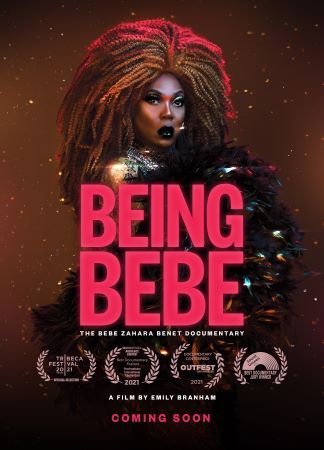
Being Bebe: The Bebe Zahara Benet Documentary 2021
Distributed by Good Docs
Produced by Emily Branham, Marc Smolowitz, Jonathan Goodman Levitt, Bat-Sheva Guez, and Diego Wyatt
Directed by Emily Branham
Streaming, 93 mins
General Adult
African Culture; African-American Culture; Homosexuality
Date Entered: 10/21/2022
Reviewed by Beth Carpenter, Student Support and Engagement Librarian, University at BuffaloBeing Bebe: The Bebe Zahara Benet Documentary feels like it’s hiding a more interesting story than the one of its main subject. Bebe Zahara Benet is the first winner of the Emmy-winning RuPaul’s Drag Race, and that first season was sometimes described as the “forgotten” season – it wasn’t available on streaming platforms for many years, the filming quality was much lower. Bebe was the winner of a reality television show that was just on the brink of becoming something, but it wasn’t there yet.
The Bebe that has been presented in this documentary, and the Bebe that exists in reality television, is simultaneously a very self-conscious person while also being very un-self-aware. They are always aware of the way they look, the things they are saying, and things feel very calculated, however Bebe seems very unaware of how they are being perceived. It’s an interesting dynamic to witness, and perhaps it’s just a measure of the grandeur Bebe feels they have always had.
There are several other through-lines in this documentary that would make interesting stories to follow. Bebe Zahara Benet is also story of a reality television winner that didn't receive the accolades, fame and fortune that they were promised. It’s an interesting dilemma that many early reality television winners discuss in interviews regarding their shows and could be a documentary all its own.
Further, and more importantly, occasionally the filmmaker speaks to gay people currently living in Cameroon, their faces blurred, their conversations full of a mixture of longing and jealousy, and also happiness at seeing someone like them out in the world, living more openly. Bebe acknowledges the difficulty of being gay in Cameroon, and wanting to change to happen, while simultaneously shunning any responsibility to push for that change, despite their status and relative fame.
When looking for a narrative, or a moral to the story that’s being told, it’s hard to find one. Bebe hasn’t achieved anything particularly monumental since winning RuPaul's Drag Race. The ending to the documentary comes quickly, with Bebe’s time on the second season of Drag Race All-Stars, and then what felt like a shoehorned mention of George Floyd’s murder in Minneapolis, Bebe’s first home in the United States. Racism and activism do not particularly play a role throughout the documentary, but is the note we end on, as if trying to prove something about Bebe, but it’s not something we were even told to believe until the last five minutes.
Awards: Jury Award, Sound Unseen Music & Film Festival; WarnerMedia Audience Award for Best Documentary Feature, Provincetown International Film Festival
Published and licensed under the Creative Commons Attribution 4.0 license. Anyone can use these reviews, so long as they comply with the terms of the license.